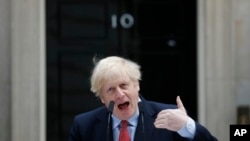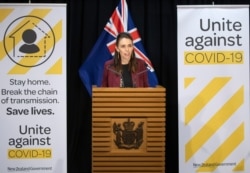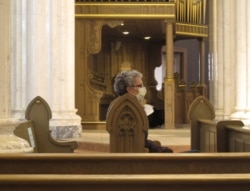New Zealand and Italy announced steps to ease their coronavirus lockdown, while British Prime Minister Boris Johnson, who returned to work Monday after contracting COVID-19, said it was too early to relax Britain's restrictions.
Johnson spoke outside his Downing Street office, saying that while he understands the impatience and anxiety people feel, relaxing restrictions right now would risk a "new wave of death and disease" that would further harm the economy.
"I refuse to throw away all the effort and the sacrifice of the British people and to risk a second major outbreak and huge loss of life and the overwhelming of the NHS," he said, referring to Britain's National Health Service.
Johnson was the first world leader to contract COVID-19 and spent several days in an intensive care unit fighting the disease.
While the number of cases of COVID-19 worldwide continues to increase and has now surpassed 3 million people, the case tally in some parts of the world is slowing down, leading governments to take steps to gradually reopen their economies.
New Zealand moved Monday to a new phase in its emergence from strict coronavirus lockdown by allowing some schools and businesses allowed to reopen.
The government reported just five new cases, and Prime Minister Jacinda Ardern said authorities would continue to chase down any new infections. New Zealand has 1,100 confirmed cases and 19 deaths.
"There is no widespread, undetected community transmission in New Zealand," Ardern declared. "We have won that battle."
The eased restrictions will allow about 400,000 people to go back to work.
It has been one month since New Zealand urged people to stay home and ordered all non-essential businesses closed. Ardern said it is too soon to say when the country will achieve no more transmissions of COVID-19, a step necessary to fully reopen the country.
Part of the reopening strategy in neighboring Australia is the use of a smartphone app meant to help state governments and health care workers trace the close contacts of those who test positive for the coronavirus.
Such tracing helps authorities figure out who should isolate themselves and who might need to be tested to prevent further spreading.
Health Minister Greg Hunt said Monday afternoon nearly 2 million Australians had downloaded the app.
In Italy, Prime Minister Giuseppe Conte said factories and building sites would be allowed to reopen on May 4. He also said people would be allowed to visit relatives in smaller groups but would have to wear face masks. Parks are set to open, but schools will remain closed until September.
Conte said there is no decision yet on when to restart the Serie A football league, but that individual players can resume training May 4, and teams can assemble for training on May 18.
COVID-19 has killed about 27,000 people in Italy.
Italy, along with Spain and Britain, reported drops Sunday in the number of daily deaths and with tolls the lowest in about a month.
World Health Organization Director-General Tedros Adhanom Ghebreyesus urged European countries that are easing their lockdowns because of declining numbers of new cases "find, isolate, test and treat all cases of COVID-19 and trace every contact, to ensure these declining trends continue."
He told a media briefing in Geneva on Monday that "the pandemic is far from over." He added that the "WHO continues to be concerned about the increasing trends in Africa, Eastern Europe, Latin America and some Asian countries."
Health officials in the Chinese city of Wuhan, where the virus originated, said there are no remaining coronavirus cases in its hospitals.
Japan and Singapore, which had early success fighting the virus, were forced to strengthen their lockdowns following resurgence in cases.
In the United States, more states took steps Monday to allow some businesses to reopen, including Minnesota, Colorado, Mississippi, Montana and Tennessee.
Georgia, which was one of the first U.S. states to begin lifting restrictions, allowed residents on Monday to again dine inside restaurants and to go to movie theaters.
U.S. health experts have warned against reopening too early, and many state governors have said measures will be put in place to protect the public's safety.
Confirmed cases of coronavirus worldwide have surpassed 3 million, and fatalities have exceeded 208,000, according to Johns Hopkins University statistics.












